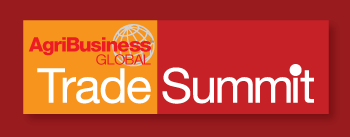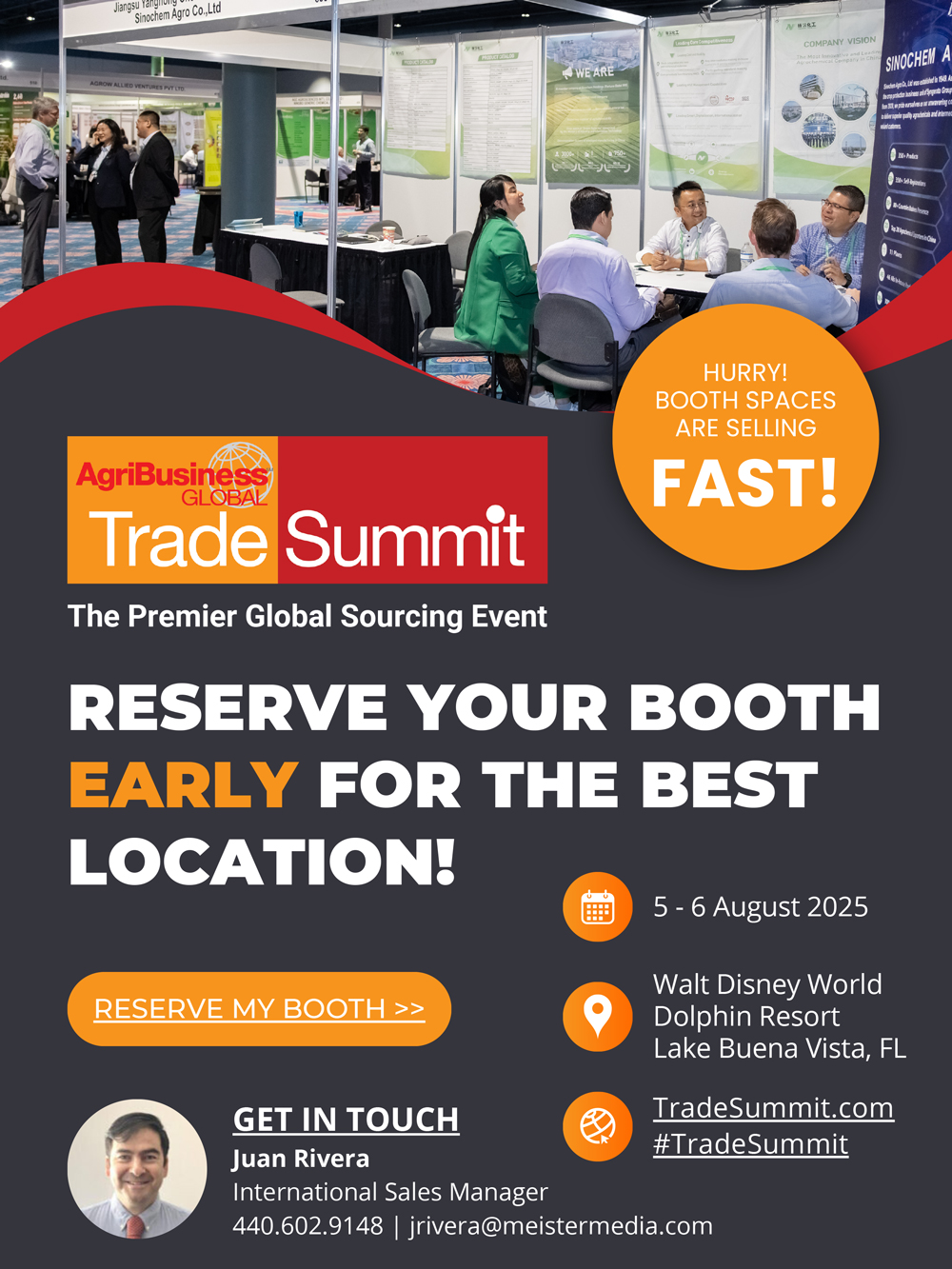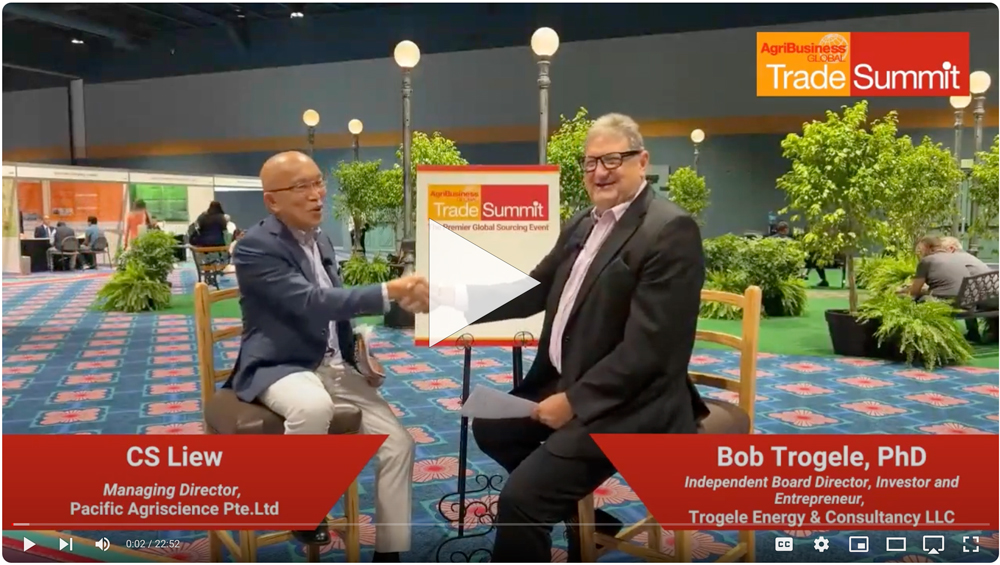AgriBusiness Global LIVE! Interviews: Responding to Big Changes

Scroll Down to Read
CS Liew, Managing Director for Pacific Agriscience and Bob Trogele, Independent Board Director, Investor and Entrepreneur for Trogele Energy & Consultancy discuss significant changes in the crop protection industry arising from climate change, geopolitical rivalries, wars, new technologies and tools and how to respond.
WATCH Video Here
*This is a partial and edited transcript
CS Liew: Right now, there’s some mega-changes happening in the industry.
There is overproduction. There is lots of capacity being built up in China as well as in India in the last ten years or so. Many formulators have also turned into technical grade manufacturers. That’s a lot of production going on. Yet globally, in this industry of $75 billion of crop protection chemicals, 93% is now generic.
As recently as 20 years ago, we were still talking about 70/30 ratio, 70% generic, 30% proprietary or patented products. Now we’re talking about 93% generic. You can imagine the margin erosion. That in itself is a major driving force behind some of these impending changes in the supply chain in terms of technology that allows farmers to be more efficient, and that will allow resellers and wholesalers to become more efficient.
There are lots of technologies out there. We will talk a little bit about all these new technologies as well as the war going on in Middle East and also in the Ukraine that is driving a lot of the ups and downs in terms of pricing, supplies, and logistics.
Based on what I’ve said now, is that a correct picture that I’m painting in terms of the current scenario?
Bob Trogele:Yes. I would say probably the other issue, which is creeping into the ag business, is the government debt and how it will be paid globally. You know we just saw the reaction in Japan with the equity markets going down 14% overnight. The U.S. national debt right now they’re paying yearly more interest than the national budget. It’s just another bubble which is going to affect farming.
CSL: Do you think interest rates will continue to rise?
BT: The question is: Will lower interest rates really change that scenario? It’ll lower the interest payments somewhat for the governments, but the governments are still squeezing out the small business owner and the small business owner is the farmer.
Farmers are competing with the government for money in the banking sector. This is something that we have to watch and see how this evolves.
Businesses that have good balance sheets and cash flow and are effective marketers, they’ll do well.
You’ll see more consolidation at farm gate. That’ll be a key driver. Besides the low commodity prices right now. The cost of doing business has gone up for farmers. The competition as far as supply, meaning to demand on the commodity side, the prices are down.
CSL: Farm gate prices are down and yet prices at the consumer level are going up. That’s a bit of an anomaly, right? Farmers are not making money because of all the factors that we have mentioned so far. But then at the same time, consumers are moaning about having to pay more for food.
BT: The food companies and processors are making quite a lot of money, right? They’re selling smaller packaging at higher prices. If you go to restaurants, especially in the U.S., you’re paying probably 100% more than you did three years ago. They’re passing on the problem on the supply side. At the farms, we’re producing too much food.
CSL: Absolutely. We still have something like three quarters of a billion people around the world who are malnourished. But the current ag system cannot price their food commodities to feed these three quarters of a billion people at the expense of the rest of the world. The farming community needs to make money. Without them making money, we’re all going to be in trouble.
BT: If you’re in an oversupply situation in an open market, it will correct. Some people will go out of business. They’ll have to retire. They will have to sell. There will be a continued consolidation.
CSL: Talking about consolidation at the farming level, what do you think of this scenario of trying to contain climate change? Lots of governments are aiming for net zero by 2050 and some are even talking about 2040, not 2050.
And because of that, there are all kinds of measures that are taken that are very unfavorable for the farming community. As an example, some governments are buying up small dairy farms and shutting them down to contain methane emissions.
There are other examples of governments doing this, which is leading to all these farmer protests early this year all over Europe. How do you think this drive towards net zero containment of climate change is going to impact food production and agriculture?
BT: I see on the growth side. For example, when you look at biodiesel coming from soybeans. When that comes, and it’s going to take five to ten years, but as soon as you have that technology coming into the market, we’ll have a bump in the soybean market for prices, because there won’t be enough supply.
Brazil, the United States, India, and Ukraine will all see a bump. There’ll be a shift to soybean acres, so that’s a positive.
On the carbon side, that market continues to grow. We’re talking about a $200 billion plus business. I don’t know where it is today, but it’s going to a trillion.
I think once the incentive for the growers is there. Research in this area is reporting at $50 an acre, that will really ignite the situation at the farm level.
A lot of companies, like Syngenta, are going into soil health in a big way. Because soil is the number one asset for the grower. If the grower is looking at it from a sustainability standpoint of the farm, then that grower is going to take care of that asset. We see that happening in Brazil.
The nutrient business and the biorational business are growing like crazy because the soil is not as rich. The pest pressure is double in the tropical climates. That market will continue to grow. And there’ll be new technologies coming into that market. Both on the input side, but also on the mapping technology side. •
Listen to the rest of the video to hear CS Liew and Bob Trogele discuss:
- Game changing technologies
- Managing labor shortages
- Gene editing
 http://[email protected]
http://[email protected]
